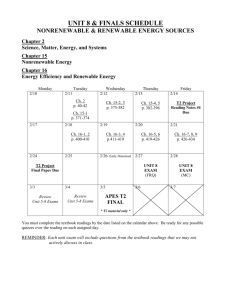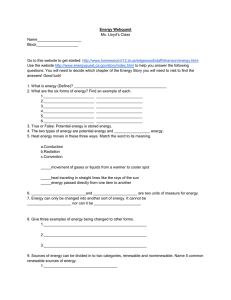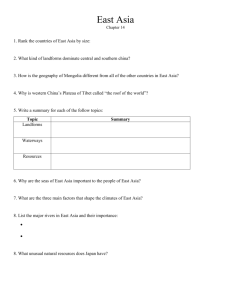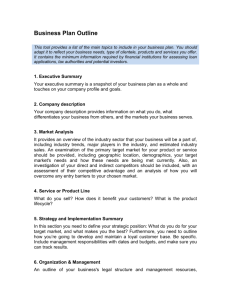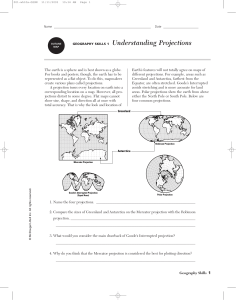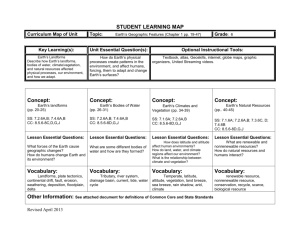Copy of packet
advertisement
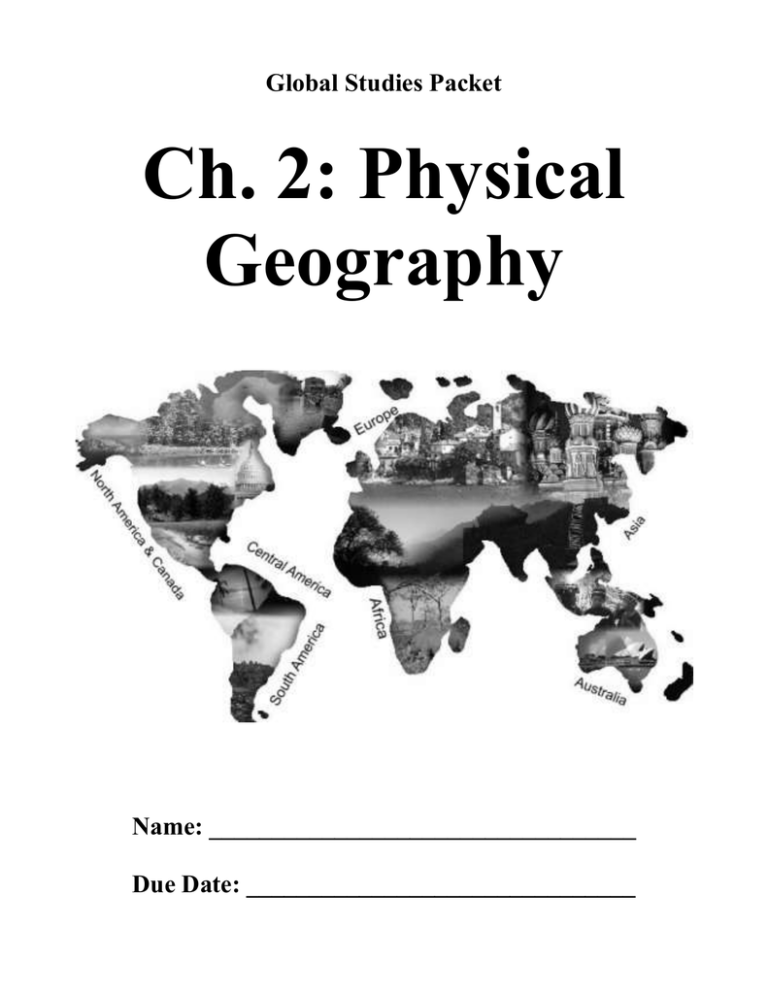
Global Studies Packet Ch. 2: Physical Geography Name: __________________________________ Due Date: _______________________________ Vocabulary Define the vocabulary words from page 15. For each term, draw a picture that represents it. Term CLASS WORK Definition Picture PAGE 1 Vocabulary (Continued) Term CLASS WORK Definition Picture PAGE 2 Vocabulary Review Fill in the blanks using the terms. delta erosion fossil fuels glacier plain plateau map projection nonrenewable renewable tropical 1. When traveling to an area with a __________________ climate, it is good to bring an umbrella. 2. Some people heat their houses with wood-burning stoves because wood is a _________________ resource. 3. A __________________ is a good area for farming because it has fertile soil and fresh water for irrigation. 4. Since they are formed from the remains of plants and tiny animals over millions of years, ___________________ like coal and oil are ___________________ resources. 5. A __________________ is a low, flat landform. 6. The Grand Canyon was formed by ___________________ caused by the Colorado River. 7. A way to show the curved surface of the Earth on a flat surface is with a ______________________. 8. A __________________ is a huge, moving mass of ice. 9. A __________________ is a high, flat landform. CLASS WORK PAGE 3 Inside the Earth Use page 16 your textbook in order to complete this activity. 1. Complete the following chart using the text and illustration. What is this layer’s name? Layer How thick is this layer? What is this layer made of? Surface Middle Center Inner and Outer Core Hint: Do the math! 2. List two (2) examples of how forces inside the earth change the surface of the earth. 1. 2. CLASS WORK PAGE 4 Rotation and Revolution Use page 20 of your textbook to fill in the blanks with the appropriate terms. seasons rotation axis tilted revolves day The earth orbit year around the sun. It takes a for the earth to complete its entire its make to make one full . The earth also spins on . It takes a for the earth to . The earth’s axis is , which causes us to have different . Rotation and Revolution Diagram As a class, we will use the information about rotation and revolution to draw a diagram. CLASS WORK PAGE 5 Climates Around the World Use pages 22-23 of your textbook in order to complete these notes about climate. I. Three Factors that Shape Climate A. _____________________ - the closer a place is to the ________________, the _________________ is tends to be B. _____________________ - the ________________ a place is above sea level, the _________________ it is C. _____________________ - prevents the __________________ of great heat and cold, places tend to have ___________________ climates than inland areas II. Climate Regions A. Far north and south- __________________ regions B. Near the poles and the middle of continents- __________________ regions C. Closer to the equator and near oceans- ___________________ regions D. Deserts- ________________ climate E. Along the equator- __________________ climate regions The World: Climate Regions Use the map on page 22 of your textbook to answer these questions. 1. Which two continents are most tropical and rainy? 2. What climates does the continental U.S. have? 3. What climates does Australia have? CLASS WORK PAGE 6 Landforms and Bodies of Water Matching Use your iPad to search the internet for “Landforms Glossary” at Enchanted Learning. Match the terms with the definitions. ______ 1. archipelago A. narrow body of water that connects two larger bodies of water ______ 2. bay B. group or chain of islands clustered together in a sea or ocean ______ 3. canyon C. flat lands that have only small changes in elevation ______ 4. cape D. pointed piece of land that sticks out into a sea, ocean, lake, or river ______ 5. delta E. narrow strip of land connecting two larger landmasses ______ 6. glacier F. stream or river that flows into a larger river G. body of land that is surrounded by water on three sides ______ 7. gulf ______ 8. isthmus ______ 9. lake H. large, flowing body of water that usually empties into a sea or ocean I. large body of water surrounded by land on all sides J. long-lasting, slowly-moving river of ice on land ______ 10. mountain K. very tall high, natural place on Earth - higher than a hill ______ 11. peninsula L. low place between mountains ______ 12. plain M. large, flat area of land that is higher than the surrounding land ______ 13. plateau N. low, watery land formed at the mouth of a river ______ 14. river O. part of the ocean or sea that is partly surrounded by land - it is usually larger than a bay ______ 15. strait P. a body of water that is partly enclosed by land - usually smaller than a gulf ______ 16. tributary Q. a deep valley with very steep sides - often carved from the Earth by a river ______ 17. valley CLASS WORK PAGE 7 Landforms and Bodies of Water Labeling Label the landforms and bodies of water using the terms listed below. archipelago isthmus peninsula bay island river gulf lake strait CLASS WORK PAGE 8 Map Projections Notes We will complete these notes in class using a powerpoint presentation. 1. The only accurate way to represent the curved surface of the Earth is with a _____________. 2. ________________________________ are ways to draw the curved areas of the Earth on a flat surface. 3. All map projections have some ______________. Different maps distort ______________, ______________, or the ______________ or ______________ of continents. 4. Here are some common map projections. I. ____________________ Projection A. Shows ____________________ accurately, so it is good for _______________________ B. ___________________ landmasses near the north and south pole C. Makes some countries look ______________ than they really are II. ____________________ Projection A. Shows the correct _______________ of countries B. Distorts the _______________ of countries and continents CLASS WORK PAGE 9 III. ___________________ Projection A. Makes many _________________ B. Nothing on this map is completely _________________ C. No major _________________ 5. Here are some other maps. I. This map splits the world in the middle of the __________________________. People in __________________ would like this map. II. This map splits the world in the middle of Asia. People in the ______________________ would like this map. III. This map has __________________ at the top of the map. People in _______________________ would like this map. CLASS WORK PAGE 10 Chapter 2 Review Complete the chapter review activities on pages 26 to 27. Write out all answers fully! Vocabulary Review (Include the term and the definition!) 1. ______________________________________________________________________ ________________________________________________________________________ 2. ______________________________________________________________________ ________________________________________________________________________ 3. ______________________________________________________________________ ________________________________________________________________________ 4. ______________________________________________________________________ ________________________________________________________________________ 5. ______________________________________________________________________ ________________________________________________________________________ Chapter Quiz (Answer in complete sentences. Include the question in your answer.) 1. ______________________________________________________________________ ________________________________________________________________________ ________________________________________________________________________ HOMEWORK PAGE 11 2. ______________________________________________________________________ ________________________________________________________________________ ________________________________________________________________________ 3. ______________________________________________________________________ ________________________________________________________________________ ________________________________________________________________________ 4. ______________________________________________________________________ ________________________________________________________________________ ________________________________________________________________________ 5. ______________________________________________________________________ ________________________________________________________________________ ________________________________________________________________________ HOMEWORK PAGE 12 Textbook Questions Map Projections (p 18) Answer questions in complete sentences! 1. What is the only accurate way to represent the earth? 2. What are map projections? 3. What is wrong with all map projections? 4. What does the Mercator projection show correctly? 5. What does the Mercator projection distort? Geographer’s Tool Kit (p 21) Use the text and map to match the questions and answers. ______1. Which directions do lines of latitude run? A. Lima ______2. What line is 0° latitude? B. Cape Town ______3. Which directions do lines of longitude run? C. prime meridian ______4. What line is 0° longitude? D. east and west ______5. Which city is located at 53° N, 0°? E. equator ______6. Which city is located at 2° N, 104° E? F. Singapore ______7. Which city is located at 13° S, 78° W? G. north and south ______8. Which city is located at 35° S, 30° E? H. London HOMEWORK PAGE 13 Using the Earth’s Resources (pp 23-24) 1. Define the following terms: a. natural resource: b. fossil fuels: c. renewable resource: d. nonrenewable resource: 2. Sort the following resources into renewable or nonrenewable. plants wind power minerals oil gasoline coal Renewable Resources trees solar power Nonrenewable Resources 1. 1. 2. 2. 3. 3. 4. 4. Global Issues (p 25) Answer questions in complete sentences! 1. What is the ozone layer? 2. What happens if the hole in the ozone layer gets bigger? HOMEWORK PAGE 14 HOMEWORK PAGE 15 Ch. 2 Study Guide Each Friday, we will have a quiz on the week’s packet. The most important things to know are on this study guide. 1. Vocabulary a. define the terms b. use them in sentences c. give examples 2. Rotation and Revolution a. use terms properly 3. Climates Around the World a. know three factors that shape climate 4. Landforms and Bodies of Water a. match terms with definitions and illustrations 5. Map Projections a. recall the only accurate way to represent the earth b. identify pictures of the Mercator, Peters, and Robinson projections c. describe the Mercator, Peters, and Robinson projections 6. Textbook Questions from Homework a. know difference between the renewable and nonrenewable resources b. sort examples into correct category STUDY GUIDE PAGE 16
